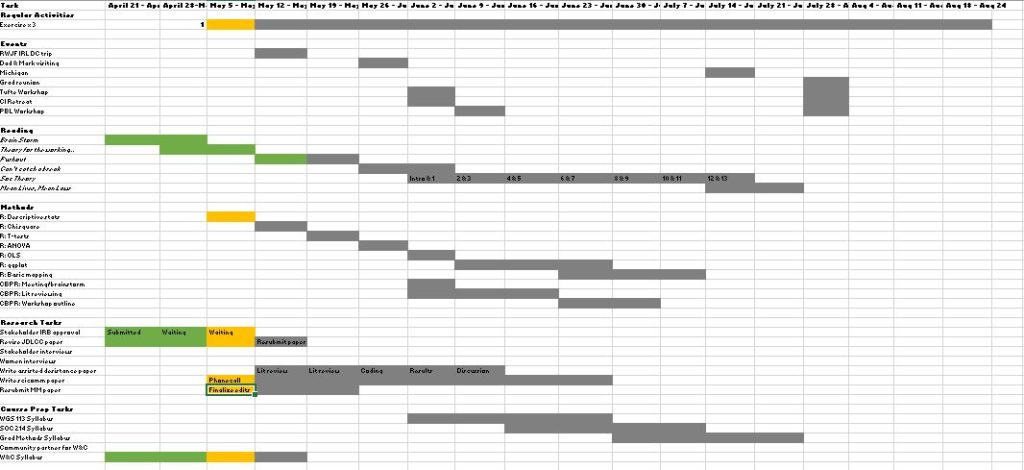I admit it: I am not very organized. I am definitely a planner, but these plans usually exist in my head, on my Google calendar, or on various Post-Its scattered across at least three different working spaces in two cities. I have a lot of big ideas, but very rarely sit down and actually plot them out. I just make “to do” lists each day and hope that I get through them — half the time I don’t even stick to them, because tasks will pop up spontaneously throughout the day and draw my attention away from The List. Big, more open-ended tasks like “revise that paper” or “analyze that data” get bumped down the list in favor of small, instant-gratification tasks like “respond to this email” or “prep that next class.”
But summer is coming.

Yes, summer is finally coming. The miserable Massachusetts winter (why do I live where the air hurts my face?) is finally over. The warmest weeks of the year stretch out ahead, unrolling like lush pastures, and friends? I have Stuff. To. Do.
People unfamiliar with academic life might think that we take summers “off,” and in some ways that is true — I don’t go to my office very much during the summer, and I rarely teach. But the summer months are the engine that drives the rest of my year, because my teaching and service responsibilities during Fall and Spring semesters carve up my days and leave little time for anything else. I don’t mean to be melodramatic, because of course I find time to do research and write during the semesters, but summer presents a unique opportunity to really get stuff done.
And yet… and yet. Summer is so gloriously unstructured that I find it all too easy to fritter the time away, chasing various loose ends but without focus or purpose. The writing gets done… kinda. The courses get prepped… er, in a panicked rush in the last two weeks before semester begins. I often find myself at the end of summer, staring into the maw of another dark winter and thinking “Oh my god, I didn’t get enough done.”
NOT THIS TIME.
I so enjoyed the Suffolk Course Design Institute and how it improved my Crime Mapping course that I decided to try and apply the principles to my summer planning — in a sense, to create a “Summer Syllabus” for myself.
I started off with goals. These were/are pretty vague but hey, no one’s giving out grades here.
“Upon completion of” this course this summer, I want to…
- … have new methodological and analytical skills that will advance my research agenda.
- … be prepared to teach my courses for next year, which includes updating old preps and completing new preps.
- … have maintained my physical and mental health by exercising regularly.
- … have revise and resubmit papers developed over the last year and make progress on papers to be submitted in the upcoming year.
- … have developed new skills that will help me be a more effective, engaging, and innovative teacher.
Ambitious! That’s why I need a plan. I will note that these are a little different to course goals, which are usually about what students will know or understand, but this is a suitable adaptation for my purposes.
Next, I needed to develop specific objectives for these goals. What will I be able to do/have done by the end of summer to meet these goals?
- For methods/analysis skills, I am going to use textbooks and online resources to teach myself how to use R and R Studio to perform all of the skills I teach in my Masters-level stats course (so descriptive and inferential stats up to linear regression), then some ggplot and basic GIS tasks. I am also going to learn more about community-based participatory research (CBPR) through my RWJF program and some independent study — and, in the spirit of the best career advice I ever received (which is to do things that check all three boxes – research, teaching, service), I’m going to translate my knowledge into a CBPR workshop for ASC 2019 and an article about doing CBPR in criminology and criminal justice research.
- Being prepared for courses means developing syllabi, of course, and updating slides. It also means reading, because I have a new graduate-level prep in Spring and I need to do a major overhaul of one of my Fall undergrad courses. To prepare for teaching those courses, I have a reading list of seven books.
- Exercise is important, too! I am committing to exercise at least three times a week, every week of summer. This can be classes at my gym, going to the new indoor rock-climbing place nearby, or going on long walks or bike rides.
- Writing needs to happen. I know I said I get it done during semester but… ugh. I struggle. I need to get a big chunk of it done this summer, and I have plenty to work on. Specific objectives here are to have my two papers-in-progress (one R&R, one multi-rejected piece I have been working on for A While) resubmitted by the end of May. I have an invited piece due by October 1, so that is the next priority, plus a coauthored paper from our evaluation of our science communication workshop. Under this goal I also have various ongoing data collection tasks that will contribute to papers for the upcoming year.
- Finally, teaching skills. I’m going to demonstrate this goal by attending a “Creativity and Innovation” workshop and a Project-Based Learning workshop, both hosted by our CTSE, and I am also attending a data visualization workshop hosted by Edward Tufte.
At this point, I would normally think about assessments. Obviously there are some concrete things that I can use to measure my progress here — checking those books off my list, attending the workshops, getting the papers submitted, etc. — but more important to me is making sure that I have all of these tasks plotted out in a way that gives me specific things to work on each week to build toward the big goals. I also want to make sure that I’m not overloading any one week, because summer is also my time to rest and recharge. I’m not sacrificing that. In fact, by planning things out, I’m protecting my time and making sure that I put boundaries on how much work I want to do each week, but still making sure that I get it all done by September!
To do that, I decided to make a Gantt chart to plan out my summer timeline. I decided to break it up by week, because this gives me a lot of structure but still the flexibility I need — I hate feeling like I have to work on something when I’m not feeling inspired or motivated by that task (I know, I need self-discipline, but… meh), so I need that built-in flexibility so I can still choose between tasks to work on, but also the built-in structure to tell myself that all the tasks need to be done by the end of the week. It also means that if something fun pops up, like the opportunity to see a friend or a perfect beach day, I can do and do that and just move tasks to another day that week.
I ended up with this (tiny on purpose, because you don’t need all the messy details!):

Across the top are the weeks (Sunday to Saturday). Down the left side are subheadings and individual tasks for each. The cells are shaded grey to show when that task will be on my week’s to-do list. As I complete the tasks, I shade the cell green. The tasks in yellow are tasks for the current week. You can see here that I’m slightly ahead on one task (reading the book Pushout – I started early!) but everything else for this week is still yellow. You can also see that I have some unscheduled time in August. This gives me flexibility to add tasks that come up in the next few weeks or to reschedule tasks that get delayed for whatever reason (e.g. delays in IRB approval, working with collaborators’ schedules).
This is an experiment! I’m not writing this post to recommend this method to anyone or because I’m convinced it will work — I have never done this before. I do know that a lot of people on Twitter whom I admire schedule their time very carefully and it works well for them, so in part I have modeled this strategy on their examples. I’ve also made it mine, because I know myself. I’ve tried to avoid scheduling things so tightly that I will end up feeling disappointed if I can’t stick to it. By planning by week and being reasonable about how much I even want to get done, I think I am increasing my chances of success.
I do think that this is already paying off for me, though. For starters, I feel a lot more confident that I’ll achieve what I want to achieve this summer. It also came in handy today after I submitted final grades and then my mind went completely blank about what I should do next — I was able to open up this Excel file and make a plan for the rest of the week (the first thing was choosing gym classes!).
How about you? Do you like to go into summer with a plan, or play it by ear? Do you schedule your time down to the hour or minute, or prefer a looser structure?
